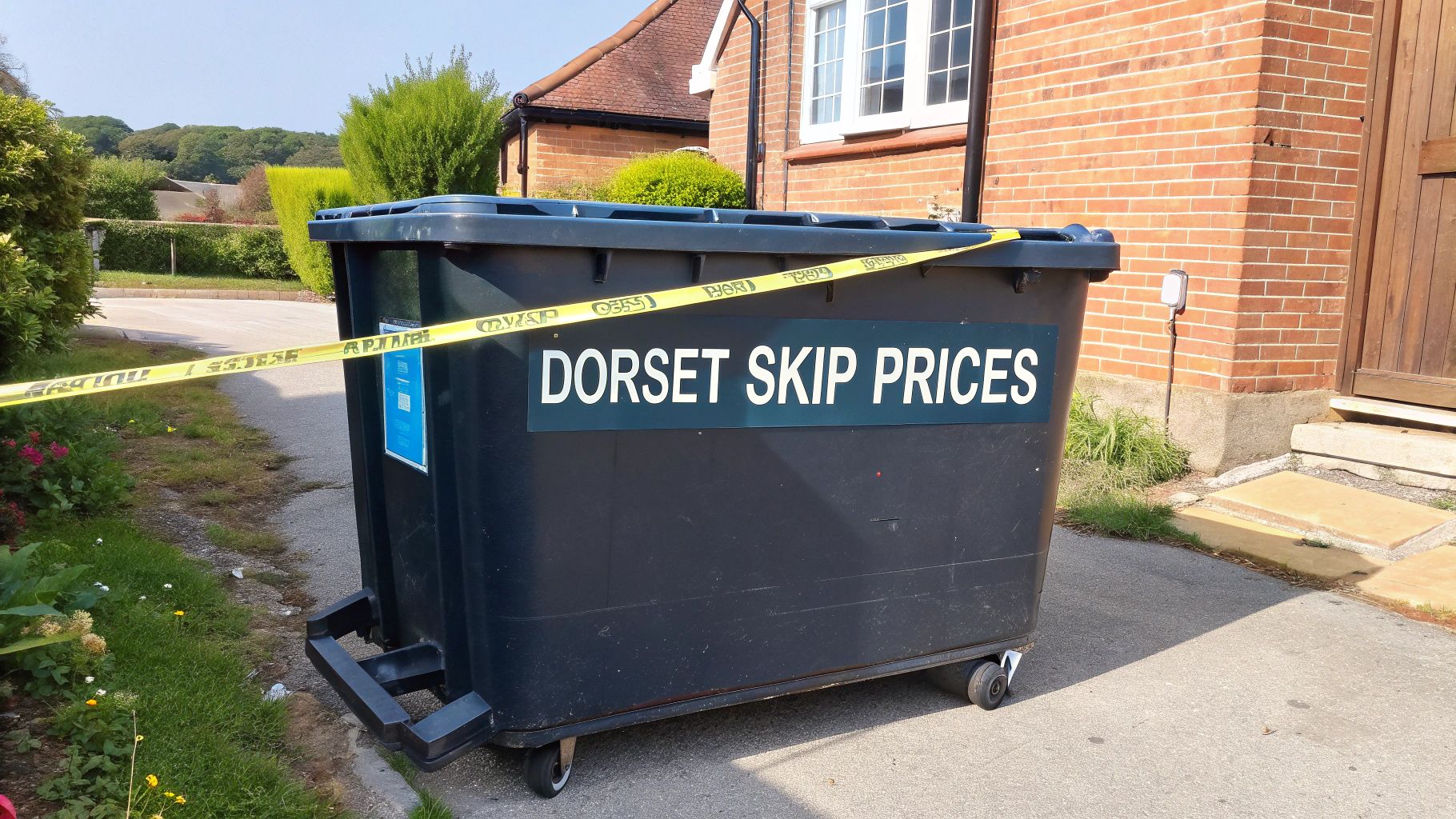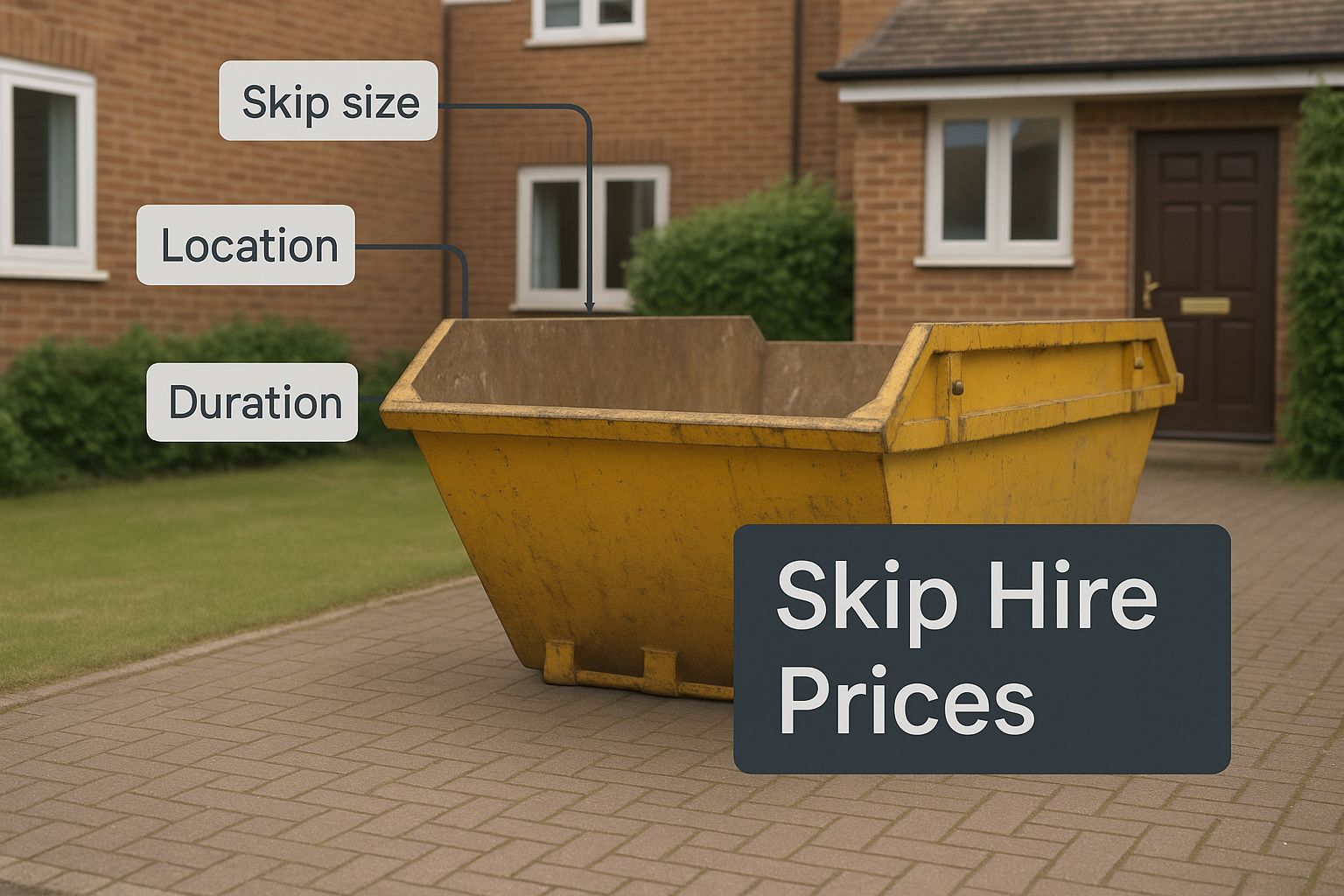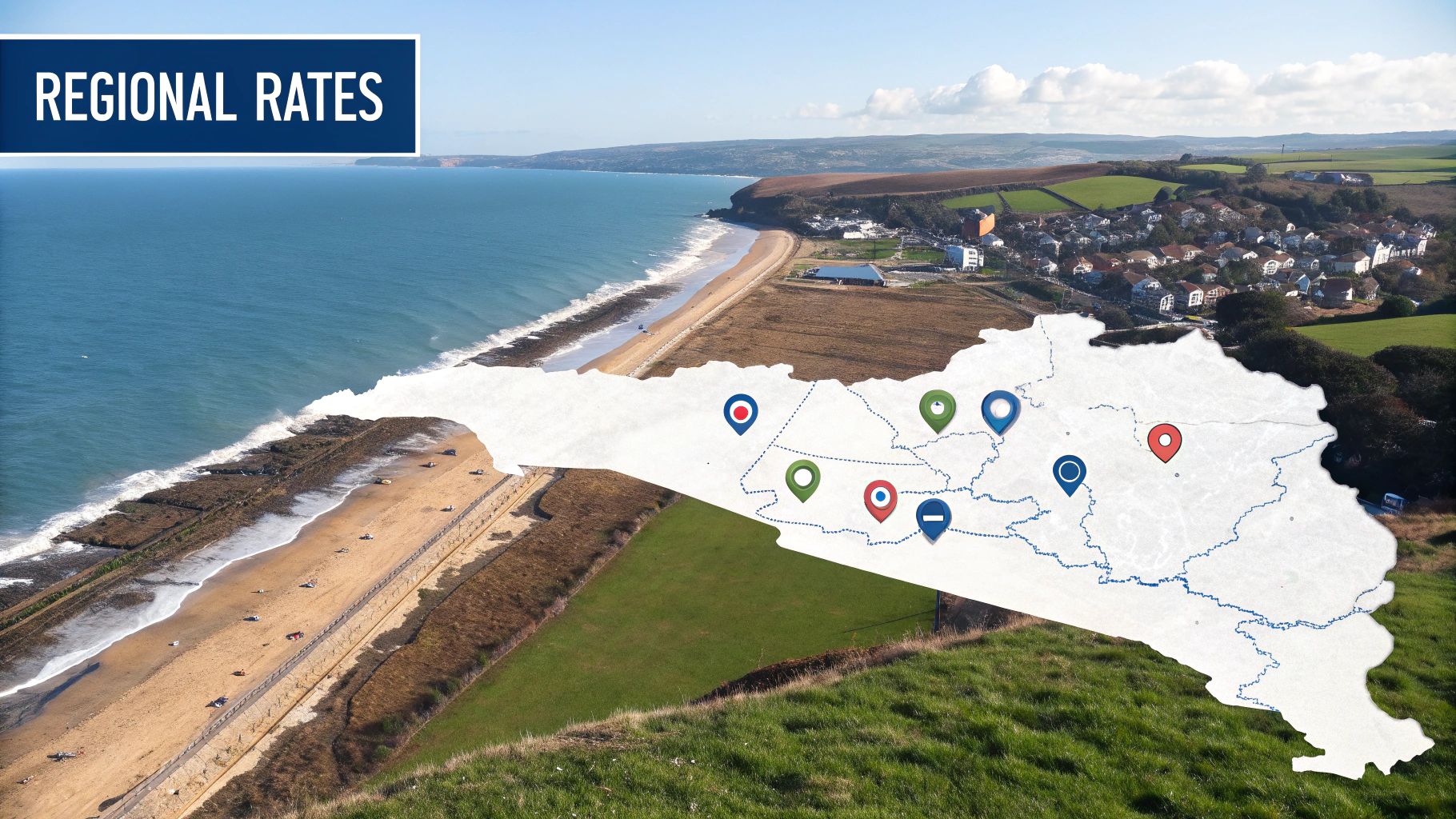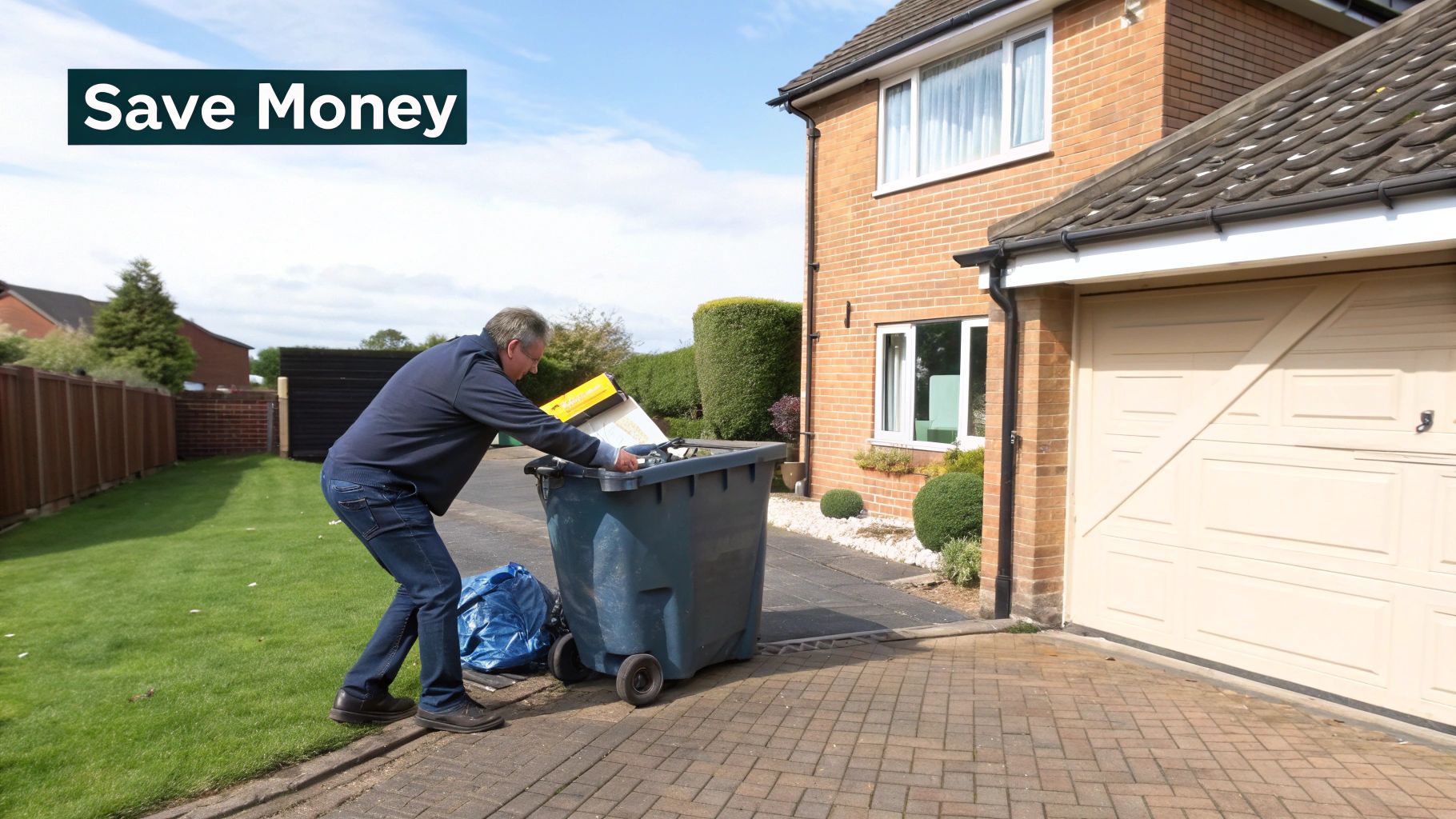Skip Hire Prices Dorset | Your Ultimate Cost Guide

Skip Hire Prices Dorset | Your Ultimate Cost Guide
Trying to get your head around skip hire prices in Dorset can feel a bit like guesswork, but it really just boils down to a few key things. As a rough guide, you can expect to pay somewhere between £90 and £150 for a small 2-yard skip, while a standard 6-yard builder’s skip will usually set you back £210 to £375.
A Guide to Dorset Skip Prices
Choosing the right skip is a bit like picking a moving van for your waste—get one that’s too big, and you’ve paid for empty space. Get one that’s too small, and you’re stuck paying for a second trip. Ouch.
The price you first see is almost always tied to the skip’s size, measured in cubic yards. Nailing this decision from the start is genuinely the most important step in keeping your project on budget.
To give you a clearer picture, let’s break down the typical costs for the most popular sizes you’ll come across in Dorset. Think of this as a quick reference guide to help you spot a fair quote when you see one.
Typical Skip Hire Prices in Dorset at a Glance
Here’s a quick look at the average weekly hire costs for common skip sizes in the Dorset area. It’s worth remembering that these prices generally don’t include the council permit fee, which is an extra cost if you need to place the skip on a public road.
| Skip Size (Cubic Yards) | Common Use Case | Estimated Price Range (£) |
|---|---|---|
| 2-3 Yards (Mini) | Perfect for a weekend garden clear-out or small DIY job. | £90 – £150 |
| 4-5 Yards (Midi) | A great middle-ground for kitchen or bathroom refits. | £150 – £275 |
| 6-8 Yards (Builder’s) | The go-to for most building projects & big house clearances. | £210 – £360 |
These figures are pretty much in line with what you’d find across the South of England—a bit pricier than up North, but definitely more affordable than London. This is mainly down to local factors like transport costs and landfill fees.
You can always explore more detailed national pricing data to see how Dorset compares. With this foundation, you’re in a much better position to understand exactly what goes into the final quote you receive.
Choosing the Right Skip Size for Your Project
Picking the correct skip size is probably the biggest decision you’ll make when it comes to the final bill. Think of it like packing for a holiday – if you grab a suitcase that’s too small, you know you’ll be paying for extra bags at the airport. On the other hand, a case that’s half-empty means you’ve just been lugging around dead weight. It’s exactly the same with waste; getting the size right from the get-go saves a lot of headaches and unnecessary costs.
The two classic mistakes people make are ordering a skip that’s too small and having to get a second one, or paying for empty space in a skip that’s way too big for the job. Both scenarios just add money to your project’s budget for no good reason. A good estimate of your waste volume means every pound you spend on skip hire prices in Dorset is working as hard as it can.

This image is a great little guide to help you picture how different skip sizes look in a real-world setting, making it easier to judge their scale and footprint. It’s just as important to know how a skip will fit on your property as it is to know how much it can actually hold.
Matching Skip Size to Your Dorset Project
To help you get a better feel for what you might need, let’s tie the common skip sizes to some typical Dorset projects. This takes things from abstract cubic yards to actual, tangible jobs you might be doing.
- 2-Yard ‘Mini’ Skip: Absolutely perfect for a weekend garden tidy-up or clearing out a small shed. You can expect to fit around 25 standard bin bags in one of these.
- 4-Yard ‘Midi’ Skip: This is a brilliant choice for a small bathroom renovation or if you’re clearing out all the old furniture from a single room.
- 6-Yard ‘Builder’s’ Skip: The go-to size for most home-based projects, like a small kitchen refit or a major garden landscaping job. It’ll hold about 60 bin bags.
If you’re still scratching your head, our guide on what size skip you might need offers even more detailed comparisons to help you nail down the right choice.
A little tip from experience: it’s often smart to choose a skip that’s slightly bigger than you think you need. The small extra cost upfront can save you from the much bigger expense of having to order a second skip later on.
Local Dorset Skip Sizes and Costs
Skip hire firms across Dorset offer a solid range of sizes to suit just about any project. For garden waste, a small 2-3 yard skip will typically set you back between £90 to £130. A medium 6-yard skip, ideal for renovations, is priced from roughly £150 to £300. For the big stuff, larger skips of 10-12 yards for those more substantial jobs fall somewhere between £220 and £440.
These prices usually include VAT but not any roadside permits you might need, which is pretty standard for Dorset’s competitive local market. For the really big undertakings, like extensive site preparation for building construction, a proper assessment of your waste volume is absolutely essential to pick the most cost-effective skip for the job.
Decoding the Hidden Factors in Your Skip Hire Quote
The size of the skip is always the headline act, but several other crucial factors are working away behind the scenes to determine your final quote. Getting to grips with these is the key to budgeting properly and sniffing out the best value for skip hire prices in Dorset.
It’s a bit like booking a flight. The base fare looks great, but then you’ve got seat selection, luggage fees, and priority boarding to think about. Skip hire works in a similar way; the initial price is just the starting point.
Your Location Within Dorset Matters
Where you are in the county can make a real difference to the cost. A straightforward delivery to a central, easy-to-reach spot in Poole or Bournemouth will likely cost less than dropping a skip in a remote village with narrow, winding lanes.
This all comes down to simple logistics. A few things can nudge the price up:
- Fuel Costs: The further our lorry has to travel from the depot, the more fuel it uses.
- Travel Time: Longer journeys mean more time on the road for the driver, which has a knock-on effect on the day’s schedule for other deliveries.
- Local Congestion: Trying to navigate busy town centres during rush hour isn’t just frustrating; it can impact delivery efficiency and, therefore, the cost.
The Type of Waste You’re Tossing Out
Not all waste is created equal, at least not in the eyes of a disposal facility. A skip filled purely with soil and hardcore (what we call inert waste) is far easier and cheaper to process than one jumbled up with household junk, wood, and plastic.
Heavier stuff like rubble and soil also bumps up the skip’s weight, which affects both transport and disposal fees. If you’ve got a mountain of one type of inert waste, it’s always worth asking if there’s a better rate for a clean, segregated load.
The rule of thumb is pretty simple: the more sorting your waste needs, the more it’s going to cost to dispose of. Separating your waste yourself is a great way to keep costs down.
Recent UK surveys show that the average price for a popular 6-yard builder’s skip often falls between £250 and £300. That variation is heavily swayed by things like waste type and local delivery logistics. And if the skip has to live on a public road in Dorset, permit fees and potential parking suspensions can easily add another £50 or more to the final bill.
Hire Duration and Seasonal Demand
The standard hire period is usually for one or two weeks. If your project drags on and you need to keep the skip for longer, you should expect to pay extra daily or weekly fees.
On top of that, demand isn’t static. During the big DIY seasons like spring and summer, prices can creep up simply because more people are clearing out their homes and gardens. Booking well in advance can sometimes help you lock in a better rate.
Ultimately, when you’re weighing up all these factors, it’s vital to remember why the lowest price isn’t always the best choice.
Navigating Skip Permits and Placement Rules in Dorset

Popping a skip on public land, like the road right outside your house, involves a little more than just picking a handy spot. It’s a formal process that requires permission from the council, and getting it wrong can add some nasty surprises to your project’s budget and timeline.
If you don’t have a private driveway or another bit of your own land to use, you’ll need to get a permit from Dorset Council. This isn’t just about ticking boxes; it’s a legal must-have under the Highways Act 1980, designed to keep everyone safe and the traffic moving smoothly.
Why You Cannot Skip the Permit
Trying to dodge this step is a gamble that rarely pays off. If you place a skip on a public road or pavement without a proper permit, Dorset Council can hit you with a fine of up to £1,000. They might even remove the skip without warning, leaving your project in limbo.
The great news? Your skip hire company should handle all of this for you. Here at The Waste Group, we know the local council’s rules inside and out, making the permit application a completely stress-free part of your booking. Just be sure to factor in the lead time, as it can take a few working days for the permit to come through.
Think of it like this: your skip hire company acts as your agent, making sure all the paperwork is filed correctly with the council. It saves you the headache of navigating the process alone and guarantees everything is done by the book.
Understanding Permit Costs and Duration
The permit fee is an extra charge on top of your skip hire and is set by Dorset Council, not us. While prices can change, it’s a cost you’ll need to budget for when working out your total skip hire prices in Dorset.
Permits are also only valid for a fixed amount of time, usually one or two weeks. If your project looks like it might run over, you’ll need to apply for an extension before the original one expires. This will come with another fee.
When you’re planning to place a skip on public land, there are a few key details to sort out first. The table below breaks down what you need to consider, from the costs involved to the safety rules you have to follow.
Dorset Skip Permit Checklist
| Requirement | Average Cost (£) | Key Information |
|---|---|---|
| Permit Application | Varies by council | This is a non-negotiable fee set by Dorset Council, paid in addition to your hire cost. |
| Lead Time | N/A | Allow 3-5 working days for the council to process and approve the permit application. |
| Safety Equipment | Included in hire | The skip must have reflective markings and safety lamps for visibility, especially at night. |
| Placement Rules | N/A | The skip cannot block driveways, pavements, manholes, or any utility access points. |
Getting to grips with these rules from the start means you can plan your project properly. It ensures your skip arrives on time without any legal hiccups, keeping your work on track and, most importantly, on budget.
Avoiding Extra Charges for Prohibited Waste

One of the surest ways to see your final skip hire bill creep up is by accidentally tossing in something that shouldn’t be there. It’s best to think of a standard skip as being for general household or construction waste only; some materials are strictly off-limits, and for very good reason.
Putting the wrong item in your skip isn’t just a minor slip-up. If the skip company finds restricted materials, you could be hit with significant extra disposal fees. In some cases, they might even refuse to collect the skip until you’ve fished the offending items out yourself. This isn’t them being difficult – it’s about making sure all waste is handled safely and responsibly.
Common Items You Cannot Put in a Skip
To keep your costs down and stay on the right side of the rules, you need to know which hazardous or tricky-to-recycle materials to keep out. Getting this right is key to managing your skip hire prices Dorset budget.
Here’s a quick checklist of the usual suspects:
- Plasterboard: Because of its chemical makeup, plasterboard has to be disposed of on its own to stop harmful gases from being released when it mixes with other waste.
- Electricals: Anything with a plug or a battery, from an old TV to a toaster (known as WEEE waste), needs to be taken to a specialist recycling facility.
- Tyres and Batteries: These are packed with harmful chemicals and have to be processed at dedicated plants.
- Fridges and Freezers: The hazardous coolants inside these appliances must be safely removed by professionals.
- Liquids: Things like paint, oil, solvents, and gas canisters are a definite no-go because of the risk of spills and contamination.
- Asbestos: This is an extremely hazardous material that can only be handled by licensed specialists for removal and disposal.
It’s vital to remember these rules. By law, the responsibility for the waste lies with you, the person who created it. If a company disposes of it incorrectly on your behalf, you could still be the one facing hefty fines.
For a more detailed rundown, our guide on what can go in a skip lays it all out clearly. For most of these prohibited items, heading to one of Dorset’s local household recycling centres is usually the best and cheapest way to dispose of them correctly.
Practical Ways to Save Money on Your Skip Hire
Getting a great deal on your skip hire prices Dorset quote isn’t just about picking the smallest size you think you can get away with. With a few smart moves, you can seriously cut down the cost and make your budget stretch a whole lot further.
Think of it like packing a suitcase for a flight with a strict baggage limit. You can’t just throw everything in and hope for the best; you have to be clever about using every inch of space. It’s the exact same principle with your skip, and it all starts with breaking things down.
Maximise Your Skip’s Capacity
One of the easiest ways to save cash is to make sure you use every last bit of the space you’re paying for. The biggest culprits for wasted space are bulky items like old furniture, big branches, or large cardboard boxes that create awkward, empty pockets.
Take a few minutes to flatten every box and break down that old wardrobe or dining table. It might seem like a bit of effort, but it can dramatically increase how much you can fit in. This simple step could mean everything fits into a 6-yard skip instead of an 8-yarder, saving you money instantly.
When you pack a skip efficiently, you’re not just saving space—you’re making sure every pound you spent on the hire goes to good use. It’s the difference between a jumbled mess and a well-organised, cost-effective clear-out.
Smart Waste Segregation Pays Off
Not all rubbish is created equal, particularly when it comes to disposal costs. Separating your waste before it even touches the skip can often get you a better deal from your hire company.
Inert waste—we’re talking soil, rubble, bricks, and concrete—is much simpler and cheaper to process and recycle than mixed general waste. If your project is churning out loads of this stuff, it’s worth asking your skip provider if they offer a cheaper rate for an inert-only skip. Keeping it separate prevents contamination and makes recycling a breeze, a saving they often pass right on to you.
Plan Ahead to Avoid Extra Fees
A little bit of forward-thinking is your best defence against surprise costs. Here are a few final tips to keep your budget firmly in check:
- Book in Advance: Don’t leave it to the last minute. During busy periods like spring and summer, booking your skip ahead of time can help you lock in a better price before demand drives them up.
- Share the Cost: If you know a neighbour is also planning a clear-out, why not team up and share a larger skip? Splitting the cost of an 8-yard skip is almost always cheaper than hiring two separate 4-yard skips.
- Stick to Your Hire Period: Be realistic about how long your project will take. Extending your hire at the last minute nearly always comes with extra daily or weekly charges, so try to get your clear-out done within the standard one or two-week window.
Proactive planning is the secret to saving money on any household project. While it focuses on electricity, the principles in guides like these energy efficiency tips for saving money on bills show how a little planning can reduce costs. Applying that same mindset to your waste management can lead to some very welcome savings.
Common Questions About Hiring a Skip in Dorset
To wrap things up, let’s tackle some of the questions we hear most often from people hiring a skip. Getting these final points clear helps make sure your project goes off without a hitch. Think of it as your last-minute checklist before you book.
How Long Can I Keep a Skip For in Dorset?
The standard hire period for most skip companies in Dorset is usually between one and two weeks, or 7 to 14 days. This is almost always what’s included in the initial price you’re quoted.
If your project is dragging on a bit longer than you planned, you’ll need to give the hire company a ring to arrange an extension. This usually comes with extra daily or weekly charges, so it’s always smart to ask about those potential costs when you first book. That way, there are no nasty surprises on the final bill.
What Is a Level Load and Why Is It Important?
A ‘level load’ is one of the golden rules of skip hire. It simply means that everything you put in the skip must stay below the height of its sides. You’ll often see a fill line painted inside to show you exactly where to stop.
Overfilling a skip isn’t just a case of bending the rules; it’s illegal and incredibly dangerous. A driver can legally refuse to collect an overloaded skip, or they might even take the excess waste off and leave it on your property. This rule is all about making sure the load can be safely netted and transported on the road without putting other drivers at risk.
Keeping your waste level with the skip’s sides is a non-negotiable safety requirement. It guarantees the skip can be transported legally and without endangering anyone on the road, which is a responsibility shared by both you and the hire company.
Do I Need to Be at Home for the Delivery and Collection?
It really depends on where the skip is going. If it’s being dropped on your private driveway and you’ve already paid and given clear instructions, you often don’t need to hang around for the delivery.
However, if the skip is being placed on a public road or if access is a bit tricky—think narrow gates, low-hanging branches, or overhead cables—it’s definitely a good idea to be there. Being on-site means you can make sure it’s positioned just right and sign any paperwork, heading off any placement problems before they start.
Can I Put Soil and Rubble in Any Skip?
Yes, you can absolutely put soil and rubble (what the industry calls ‘inert waste’) in a skip, but it’s always worth double-checking with the hire company first. Some companies even offer a discount for skips that only contain this kind of waste because it’s so much easier and cheaper for them to recycle.
Mixing heavy stuff like soil and bricks with your general waste can sometimes push the price up. This is because the skip’s final weight will be higher and the contents will need more sorting. If you’ve got a mountain of inert waste to shift, asking about an inert-only skip is a savvy move that could lower your overall skip hire prices in Dorset.
Ready to manage your waste the easy way? For competitive pricing and expert advice on skip hire across Dorset, get in touch with The Waste Group. We offer a price-match guarantee and a hassle-free booking process. Get Your Instant Quote Today.


